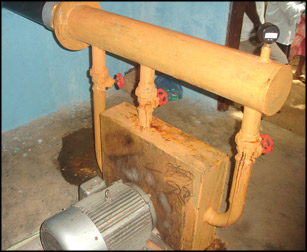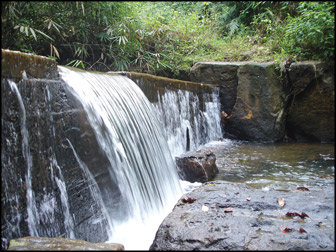|
Sustainable utilisation:
The way for forest conservation
by Gamini WARUSHAMANA
How is the environment protected in an open capitalist economy where
everything is being valued in rupees and cents? No other option, let the
people derive money from the environment in a sustainable manner, said
the CEO of the Human and Environment Development Organisation (HEDO),
Anura Prematilake.
 |
|
A micro power plant |
HEDO has put this method into practice and successfully concluded a
project in Dereniyagala in the Kegalle district and the project has been
recognised by the United Nations as a successful model.
The Rajruwagala Forest Conservation Project in Dereniyagala is
evidence of the sustainable cohabitation between the community and the
forest. The project was funded by the EU and the UNDP. By the time the
conservation project was launched in 2007 the Rajruwagala forest was
half destroyed by the community themselves creating serious issues to
their lives, Prematilake said. The forest was cut down for timber, wood
for gem mining and under growers such as cane and bamboo were
excessively cut and sold for the industries. Tea small holdings
encroached the forest in all directions. Excess use of chemical
fertiliser polluted water.The community earned money from the forest
direct and it came to an end. Finally this forest destruction lead to a
drop in the water table level. Water pollution, land slides, decline in
the bee population and erosion of top soil.
The demand to reverse the process came from the community itself. The
communities in the three villages Imbulavitiya, Kohiladeniya and
Gallelihella bordering the Rajruwagala Forest were mobilised by HEDO
enabling them to extract forest resources in a sustainable manner for
their livelihood.
Prematilake explained his experience. Firstly we marked forest
boundaries with the assistance of the forest department. This was the
most difficult part in the project because people had invaded the forest
and cultivated tea and other crops. Therefore at the beginning all the
villagers were not with the project. The Chief Incumbent of the Temple
Ven. Ambalanpitiye Saddhananda Thero played a commendable role in
attracting people to the project. It was not difficult to make people
aware of the value of the conservation of the forest, because they were
experiencing the dire consequence of the damages they had done.
The community was organised in small groups and they are vigilant of
any unauthorised entry into the forest or any destruction. Replantation
was done with the widest participation of the people.
Then we realised that unless the forest gives direct benefits to the
communities this process would not continue. These remote villages
situated nearly two three kms away from the Deraniyagala-Ratnapura main
bus route. The roads were not motorable, there was no electricity or
safe drinking water for the households. The project launched three micro
hydro electricity sub projects Imbulavitiya 7 Kw, Kohiladeniya 2 Kw and
Gallelihella 3 KW and a water supply project.
In the electricity project the technology is simple and the water is
carried by a PVC pipe from the upstream. It is connected to the turbine
that powers a small generator. The generated electricity goes through
voltage and frequency stabiliser and the excess supply is burnt by three
heaters.
The area bordered the Sri Pada Rain Forest is blessed by nature and
receive heavy rainfall during ten months of the year. There are small
water streams everywhere. The Imbulavitiya hydropower plant is located
on the bank of a small water stream at the boundary of the Rajruwagala
forest. K.P. Sumith Kumara, the caretaker of this small power house is
responsible for providing uninterrupted power supply for 21 households
and the temple of the village. He is an employee of the electricity
consumer society of the village. His salary and maintenance cost of the
plant and the distribution line is Rs. 250 monthly fee (a fraction of
what the rest of the people pay for the electricity from the national
grid) given by the electricity consumers. Kumara as well as all other
electricity consumers are now responsible for the protection of the
forest.
 |
|
A water stream flowing
from the Rajruwagala forest |
The technical consultant of the project G.M.K. Nayanananda said that
the project provides 230V supply throughout the day. During the daytime
when the usage is limited the generation reduces to one third of the
capacity. HEDO has also generated livelihoods connected with the forest
for the communities . The jaggery, Kitul treacle and bee honey
production has become lucrative businesses for the people. E.U.
Indrapala (32) who is engaged in Kitul tapping said his average monthly
income is over Rs. 40,000. In good months I earn around Rs. 60,000. We
get Rs. 350/kg price for jaggery after HEDO's initiative. Earlier the
price was around 150 and this industry was not attractive. HEDO
purchases a part of the village jaggery production and market it under
Green Lanka label.
The people who regularly enter into the forest for Kitul tapping keep
a vigilant eye on any damage to the forest. Prematilake said that this
is another objective of promoting this industry.
Organic fertiliser manufacturing project has been initiated to reduce
chemical fertiliser usage. Liquid fertiliser produced through Wormy
culture is also used by the smallscale tea growers.
The computer training centre at the temple provides IT training for
the village children and youth free of charge. Though the physical
connectivity of the village with the rest of the world is difficult the
village is connected via mobile and CDMA telephones. Today, few years
after the conclusion of the conservation work the living standard of the
people have improved significantly.
The power projects and livelihood projects are managed by the
community without HEDO intervention. They have gained technical skills
to maintain power plants, Prematilake said. People too said that after
the project they purchased TV and other electrical appliances,
telephones and their lives are changed.
HEDO plans to extend the project to eco tourism. We have huge
potential and it would provide income for the community while they
further bound with protection of the environment, Prematilake said.
|

